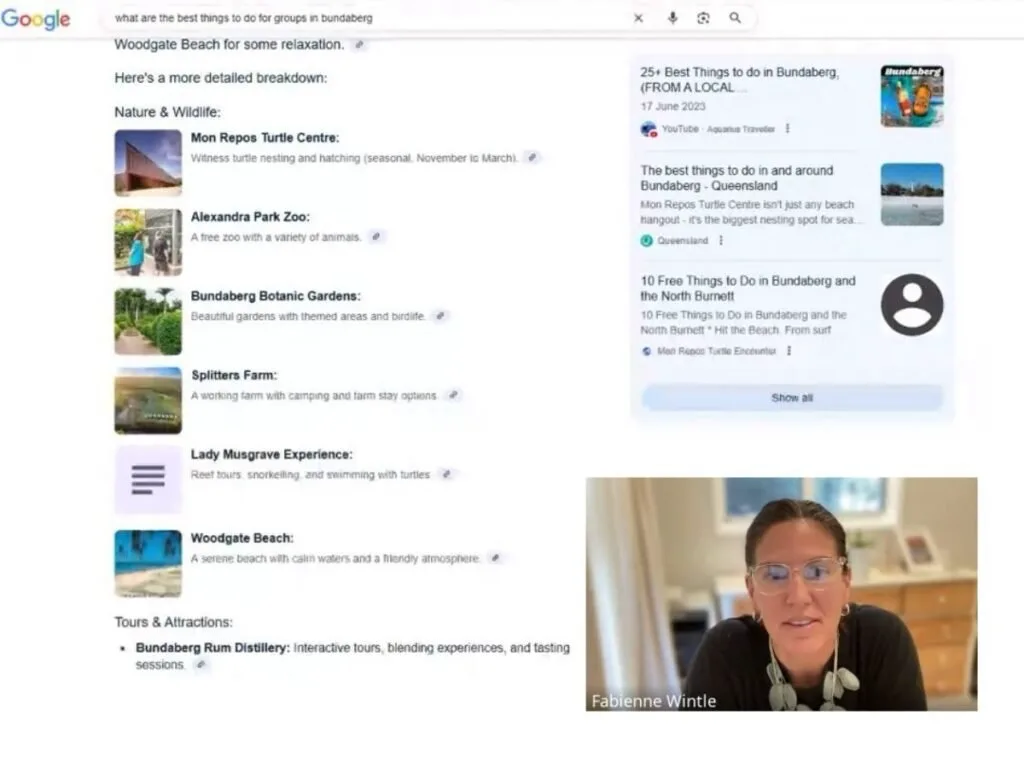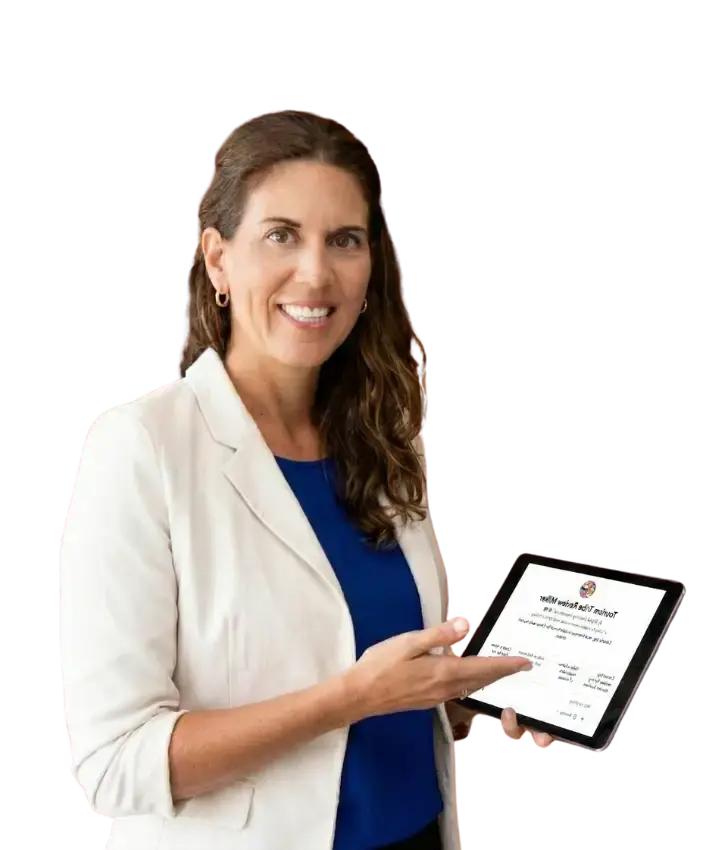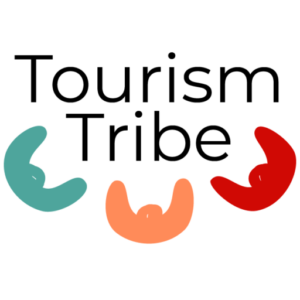Get Seen by AI (and Real People): What We Covered in Our Latest Tourism Tech Session

Wondering how to get seen by AI? The way travellers plan and book their trips is changing fast, and if your tourism business isn’t showing up in AI search results, you’re already behind. In our latest Tourism Tech Session, we unpacked how search engines like Google and tools like ChatGPT are evolving, what that means for your website, and what you can do right now to improve your visibility.
From real examples to live audits to GEO (Generative Engine Optimisation) best practices, here’s everything we covered, plus links to tools, courses, and checklists to help you take action.
Missed the live session? Don’t worry!
If you’re a logged in Tourism Tribe member with a valid Digital Assistance Plan you’ll see the replay below. Login here. If you’re not a member, this article will walk you through the key takeaways, actionable strategies, and crucial insights shared.
What are Tourism Tech support sessions?
Our Tourism Tech Sessions are designed to support digital coaching program participants and Digital Assistance members. Whether you’re in the Destination NSW or Onkaparinga programs, or a direct member of Tourism Tribe, these sessions provide a space to:
- Learn what’s new in tourism tech
- Ask questions in a safe, supportive environment
- Hear real-life examples and get practical demos
- Get the confidence to implement what you’ve learned
Voice search and AI Agents are here: are you ready?
One of the hot topics of the session was voice-based AI agents, like the advanced ChatGPT voice mode and AI assistants making sales calls. This is no longer sci-fi, it’s already happening – they’re already shaping how travellers research and book experiences. Whether it’s ChatGPT reading out recommendations or AI bots making phone calls, these tools rely on well-structured content to deliver answers.
Tip from Fabi: She had a two-hour driving conversation with ChatGPT’s Advance Voice Mode that felt like talking to a top-tier consultant! Have you tried it? You could be asking it how to optimise your tourism website to be picked up by AI engines, whilst you walk your dog or have a long drive next.
The takeaway? Your customers may soon be talking to AI instead of Googling. So if your content isn’t optimised to be found and understood by AI, it simply won’t be surfaced.
Understanding Generative Engine Optimisation (GEO)
GEO = Generative Engine Optimisation, an evolution of traditional SEO. GEO helps your tourism business get found in AI-powered tools like ChatGPT and Google’s AI Overview by making sure your content is clear, structured, and easy for machines to understand and recommend. Unlike traditional SEO, which focuses on keywords and rankings, GEO helps structure your content so AI can summarise it and recommend your business as a trusted, expert source, whether someone’s typing, talking, or tapping for travel advice.
Think about it this way:
AI search engines don’t just look for keywords; they summarise content and offer a conversational answer. If your content isn’t structured and rich enough, you’re invisible.
Key GEO tactics covered:
- Use pillar content (e.g. main tours or experiences)
- Create supporting cluster content (e.g. blog posts answering real visitor questions)
- Implement schema markup (e.g. FAQs, Events, LocalBusiness info)
- Optimise images and headings
- Keep content fresh and frequently updated
Real-time demo: Google AI overview
Google’s AI Overview is a new feature being rolled out in search results that uses generative AI to provide a concise, conversational summary of information in response to a query right at the top of the page, above traditional search listings. Instead of showing just blue links, Google’s AI Overview pulls key information from multiple high-quality sources and presents it in a natural-language format, often answering the user’s question directly. For example, a search like “What are the best things to do in Bundaberg?” might return a short paragraph listing top experiences, complete with links and images without the user needing to scroll.
Why it matters for tourism businesses:
- AI Overview skips over average content and prioritises well-structured, clearly written, and context-rich pages.
- It often pulls from blog posts, FAQs, and schema-enhanced content that directly answer common visitor questions.
- If your website doesn’t meet these standards, you’ll likely be left out of AI summaries, reducing your visibility at a critical point in the decision-making process.
We explored Google’s new AI Overview feature (currently rolling out in Australia), showing how it displays instant summaries at the top of search results based on high-quality content.
🔍 Example searched: “Can you give me some ideas to great venues to celebrate my birthday in Gosford?
Google’s AI overview pulled content from venues that had relevant, well-written content, including blogs about birthday functions, even if birthday parties weren’t their main product.
Lesson: Google and AI models use your content to infer what your business is good for. If your site doesn’t talk about these themes, you won’t be included. We have a whole category of articles and podcasts we have written and recorded to help your tourism business rank better in AI results, check them out here.
Hot tip: Blog smart, not hard
Blogging is still one of the most powerful ways to improve your visibility but your blogging strategy needs to be updated from a few years back. To succeed in AI-powered search, your blog content needs to go beyond general updates or one-off stories. It should now be written with Generative Engine Optimisation (GEO) in mind—answering real visitor questions, supporting your core products, and using structured formats that help AI tools like ChatGPT and Google AI Overview understand and surface your content.
If you want to start ranking well in AI searches you need to write content regularly on topics that support your main offer. Here is our tip:
- Write ~1000–1500 word blog posts answering real customer questions
- Link blog posts to your main service pages
- Use heading structures properly (H1, H2, H3)
- Add feature images and SEO descriptions to every blog
- Update old blog posts rather than duplicating them
Example: If your kayak tour is a best-seller, write a blog about “Why kayaking is the perfect honeymoon experience in Agnes Water” and link it to your tour page.
Must-have tools from the session
These tools help you see your website the way search engines and AI tools do. From checking if your pages are indexed (appear in search results) to analysing headings, schema, and accessibility, they’re essential for spotting missed opportunities and making sure your content is ready to be found and recommended by both traditional and AI searches.
- SEO Pro Extension: View page structure, headings, and index settings in Chrome
- WAVE Accessibility Tool: Check how accessible your site is for all users
- Site Index Test: Search
site:yourdomain.comin Google to see what’s indexed - ChatGPT: Use it to brainstorm blog topics based on customer reviews
Common pitfalls to avoid
- ❌ Duplicate heading tags (e.g. multiple H1s on a page)
- ❌ Feature images missing from blog posts or tour listings
- ❌ New websites accidentally set to “noindex” (blocking search engines)
- ❌ Relying solely on your web developer for SEO. They may not have AI readiness in mind
What’s Next?
In your Tourism Tribe course library, the updated SEO course now includes:
- A 10-step optimisation checklist
- Clear examples of schema use
- Tools to track your visibility in AI and traditional search
You can also post questions at the bottom of each lesson or book a private coaching session to review your setup one-on-one.
FAQ
How fast does AI pick up new blog posts?
Within days, though sometimes slightly shorter or longer.
Can I update old blog posts?
Yes, not only can you update old posts, you definitely SHOULD update old posts – it signals expertise and currency to both search and AI, which will help you to be found online!
Is WordPress better than Squarespace?
WordPress is far superior for SEO and GEO and it is customisable – you can add your own plugins. However, it’s also more complicated, we suggest having a WordPress website developed and upkept by a professional, though you can definitely update the content and photos yourself and absolutely must have admin permissions. Squarespace is simpler, you could create and upkeep it yourself, but ultimately, you’ll most likely find it limiting.
I’m not a Tourism Tribe Digital Assistance Plan member. Can I still access this tutorial?
The full replay is only available to members who are logged in. But you can read the full blog post and get a sense of what’s possible. If you’d like access to future sessions, check out our Digital Assistance Plan options.
What course should I start with in the Tourism Tribe course library?
Begin with Digital Foundations, then progress to Digital Champions 101.

Free resources to grow your tourism business
Sign up to get our free AI tools, checklists, roadmaps and guides, plus episodes of Untangling Tourism Tech delivered straight to your inbox.
